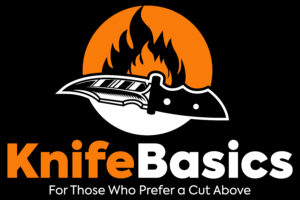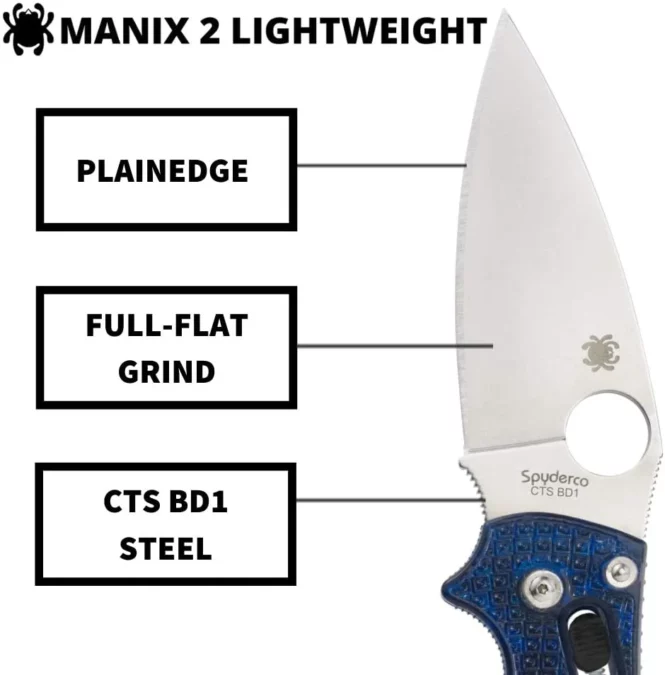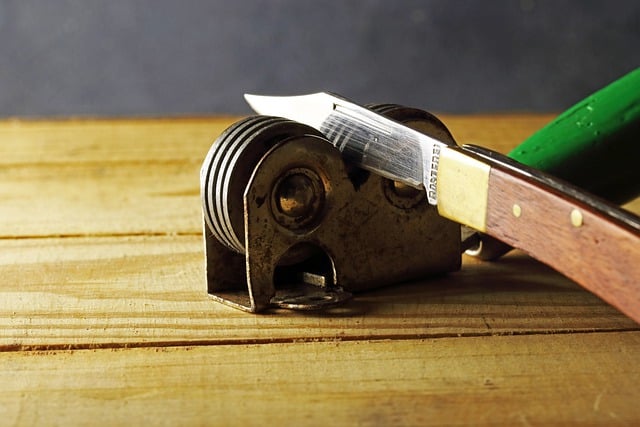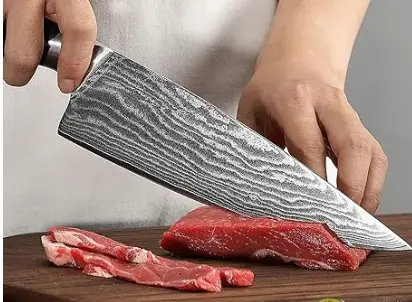CTS BD1 steel is low-end vacuum melted stainless steel manufactured by Carpenter, a company based in the US. The CTS on the name is the short form of Carpenter Technology Corporation, a company known to produce high-performance steel.
What’s more, the steel contains high amounts of Carbon and Chromium and therefore offers good corrosion resistance and edge retention.
CTS BD1 is used in the knife industry to make EDC knives and camping knives. It is also useful in other industries to manufacture cutlery, ball bearings, and small parts of machines exposed to high wear applications.
CTS BD1 Steel Chemical Composition
- Carbon C 0.95%: Increases edge retention, hardness, and tensile strength. It also improves steel resistance to wear, abrasion, and corrosion.
- Chromium Cr 17.00%: Formation of Chromium carbides. Increases the blade’s hardness, tensile strength, and corrosion resistance.
- Molybdenum Mo 0.50%: It improves machinability and hardness.
- Phosphorous P 0.04%: Increases the strength and improves machinability of steel
- Manganese Mn 1.00%: improves the strength and hardness of steel. When the steel is heat-treated, hardenability is improved with increased manganese.
- Silicon Si 1.00%: Increases strength and heat resistance.
- Sulfur S 0.03%: Improves machinability but is regarded as an impurity in high quantities.
Properties of CTS BD1 steel
CTS BD1 Steel Hardness
The hardness of CTS BD1 is 58-60 HRC on the Rockwell hardness scale. Note that the hardness differs depending on the heat treatment used by the manufacturer. Because of this hardness level, the steel offers great edge retention and wear resistance capabilities.
CTS BD1 Steel Edge retention
As already stated, the high hardness of this steel gives it great edge retention. It stays sharp longer than other steels in the same category, like 8Cr13MoV and AUS-8.
Therefore, if you are in search of low-budget knives that won’t require you to sharpen often, look into the varieties of CTS BD1 steel.
Carpenter quotes that it has finely balanced the alloy of this steel with proprietary additions in order to improve its edge retention.
CTS BD1 Steel Wear resistance
Compared to other steels in the low-end category, CTS BD1 lasts longer. This is associated with its hardness level.
CTS BD1 steel was made in such a way that it likens the wear resistance of tool steels hence can be used in applications that need excessive wear resistance, it has been used to make bearings too.
It can withstand normal wear and tear from daily applications longer, and this is why it is more costly than other low-end knives.
CTS BD1 Steel Toughness
We can refer to the toughness of CTS BD1 as decent. Although we cannot compare its toughness with what is offered by high-end steel, it is tough enough to withstand hard applications.
However, it is advisable to use CTS BD1 knives for normal use if you want them to serve you for long. Subjecting it to tough applications will make it chip and break easily and faster.
CTS BD1 Steel Corrosion resistance
CTS BD1 contains high amounts of Chromium, giving it good corrosion resistance properties. It thus can resist corrosion from most organic materials, water, petroleum products, and mild acidic environment.
However, you have to note that this steel is not 100% corrosion resistant. Therefore, it still requires tender care and love to keep off the rust. Ensure to wash and dry the blades of CTS BD1 knives after use. You can as well apply a coat of oil during storage for extra protection.
Carpenter official documentation states that this steel corrosion resistance can be compared to that of Type 410 steel.
You need to note that the alloy of this steel does not allow it to be used at elevated temperatures, this will drastically reduce its corrosion resistance.
Sharpening CTS BD1 Steel
Considering the hardness level, you might be assuming that this steel is hard to sharpen. But, this is not the case.
The steel is very easy to sharpen and attains a razor-sharp edge faster, irrespective of the abrasive tools used or your sharpening skills.
If you are learning how to sharpen knives, CTS BD1 steel is a good choice to start your training.
Comparison with other knife steel options
CTS BD1 vs. CTS BD1N
CTS BD1N steel is an upgrade to CTS BD1. CTS BD1N is alloy nitrogen-bearing high carbon chromium martensitic steel, and therefore offers higher hardness than CTS BD1.
Its hardness is rated at around 60-63 HRC which is about 3-4 HRC more than CTS BD1. With that said, CTS BD1N offers better edge retention and wear resistance.
The inclusion of Nitrogen CTS BD1N offers better corrosion resistance and edge retention. In addition, knives made from CTS BD1N are more expensive.
CTS BD1 vs. VG-10 Steel
Being mid-range steel, VG10 comes with greater hardness than CTS BD1 and offers better edge retention and wear resistance. On the other hand, CTS BD1 offers better toughness than its counterpart.
In terms of corrosion resistance, they perform almost identical but VG-10 stainless steel has an advantage over CTS BD1 steel this is attributed to the high vanadium elements in its alloy.
CTS BD1 vs. AUS-8
Both CTS BD1 and AUS-8 steel fall under the low-end category. However, CTS BD1 is harder than the AUS 8. This means that it is better in edge retention, wear resistance, and corrosion resistance. On the other hand, being softer, AUS-8 is easier to sharpen.
Is CTS BD1 steel good for knives?
Looking at its properties, we can say that CTS BD1 is a good steel for knives. It offers excellent corrosion resistance, decent toughness, great wear resistance, and it is easy to sharpen. This steel is an improved version of most low-end steel.
If you need an even better knife at a slightly increased budget, you should consider the likes of CTS BD1N steel. The steel is an upgraded version of CTS BD1 steel and will offer better hardness, wear resistance, and corrosion resistance.



